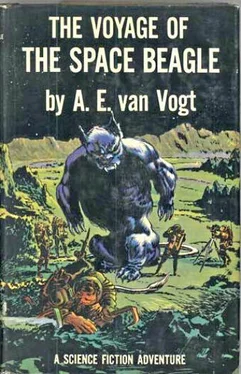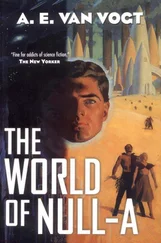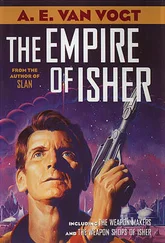“Which proves,” said Morton, “that he isn’t invincible, or he would have done it long ago.”
In a deliberate fashion, he walked over to the mechanism that controlled the cage.
“You’re not going to open the door!” Kent gasped, and reached for his blaster.
“No, but if I pull this switch, electricity will flow through the floor and electrocute whatever is inside. We had that built into all our specimen cages as a precaution.”
He unlocked the special electrocution switch and jerked the switch itself hard over. For a moment the power was full on. Then blue fire flashed from the metal, and a bank of fuses above Morton’s head went black. Morton reached up, took one of them out of its socket, and frowned down at it.
“That’s funny,” he said. “Those fuses shouldn’t have blown!” He shook his head. “Well, we can’t even look inside the cage now. That wrecked the audio, also.”
Smith said, “If he could interfere with the electric lock enough to open the door, then he very likely probed every possible danger and was ready to interfere when you threw the switch.”
“At least it proves he’s vulnerable to our energies,” Morton said grimly. “Because he had to render them harmless. The important thing is, we’ve got him behind four inches of the toughest of metals. At worst, we can open the door and turn a semi-portable blaster on him. But, first, I think we’ll try to feed electricity in there through the telefluor power cable.”
A sound from inside the cage interrupted his words. A heavy body crashed against a wall. That was followed by a sustained thudding, as if many objects were collapsing to the floor. Grosvenor mentally compared it to a small landslide.
“He knows what we’re trying to do,” Smith said to Morton. “And I’ll bet it’s a very sick pussy in there. What a fool he was to go back in the cage, and does he realize it!”
The tension was relaxing. Men were smiling nervously. There was even a ripple of humourless laughter at the picture Smith had drawn of the monster’s discomfiture. Grosvenor was puzzled. He didn’t like the sounds he had heard. Hearing was the most deceptive of senses. It was impossible to identify what had happened or was happening in the cage.
“What I’d like to know,” said Pennons, the chief engineer, “is why did the telefluor-meter dial jump and waver at full power when pussy made that noise? It’s right here under my nose, and I’ve been trying to guess what happened.”
There was silence both within and without the cage. Abruptly, there was a stir in the doorway behind Smith, Captain Leeth and two officers in their military uniforms stepped into the corridor.
The commander, a wiry man of fifty, said, “I think I’d better take charge here. There seems to be some conflict between the scientists as to whether or not this monster should be killed — is that right?”
Morton shook his head. “The conflict is over. We all feel now he should be executed.”
Captain Leeth nodded. “That was the order I was about to give. I believe the security of the ship is threatened, and that’s my province.” He raised his voice. “Make room here! Get back!”
It took several minutes to ease the pressure in the corridor. Grosvenor was glad when it was done. If the creature had come out while those in the foreground were unable to move back quickly, he’d have been able to destroy or injure many men. That danger wasn’t completely over, but it was alleviated.
Somebody said, “That’s funny! The ship seemed to move just then!”
Grosvenor had felt it, also, as if for an instant the drive had been tested. The big ship trembled as it settled back from that moment of straining.
Captain Leeth said sharply, “Pennons, who’s down in the engine room?”
The chief engineer was pale. “My assistant and his helpers. I don’t see how they—”
There was a jerk. The big ship careened, and threatened to fall on its side. Grosvenor was flung with cruel violence to the floor. He lay stunned, and then in alarm fought back to consciousness. Other men were sprawled all around him. Some of them were groaning in pain. Director Morton yelled something, an order Grosvenor didn’t hear. Then Captain Leeth was struggling to his feet. He was cursing. Grosvenor heard him say savagely, “Who the devil started those engines!”
The frightful acceleration continued. It was at least five, possibly six gravities. Having assessed its tremendous force as being within his capabilities, Grosvenor climbed agonizingly to his feet. He rumbled with the nearest wall communicator, and punched the engine-room number, not really expecting that it would work. Behind him, a man let out a bass bellow. Grosvenor turned in surprise. Director Morton was peering over his shoulder. The big man called out, “It’s pussy! He’s in the engine room. And we’re heading out into space.”
Even as Morton spoke, the screen went black. And still the pressure of acceleration continued. Grosvenor staggered through the door into the salon, and across the great room into a second corridor. There was, he remembered, a space-suit store-room there. As he approached it, he saw that Captain Leeth was ahead of him and was in the act of fumbling his body into a suit. As Grosvenor came up, the commander closed up the suit and manipulated its anti-acceleration unit.
Quickly he turned to help Grosvenor. A minute later, Grosvenor sighed with relief as he reduced the gravity of his suit to one G. There were two of them now; and other men were stumbling up. It took only a few minutes to exhaust the supply of space suits in that store-room. They went down to the next floor and brought up suits from there. But now dozens of the crew members were available for the job. Captain Leeth had already disappeared; and Grosvenor, guessing the next step to be taken, hurried back to the cage where the big cat had been imprisoned. He found a score of scientists assembled at the door, which had apparently just been opened.
Grosvenor pressed forward and peered over the shoulders of those who were ahead of him. There was a gaping hole in the rear wall of the cage. The hole was big enough for five men to have squeezed through at one time. The metal looked bent, and had numerous jagged edges. The hole opened on to another corridor.
“I’ll swear,” whispered Pennons through the unclosed headpiece of his space suit, “that it’s impossible. The ten-ton hammer of the machine shop couldn’t more than dent four inches of micro-steel with one blow. And we heard only one. It would take at least a minute for the atomic disintegrator to do the job, but the whole area would be poisonously radio-active for several weeks at least. Morton, this is a super-being!”
The Director made no reply. Grosvenor saw that Smith was examining the break in the wall. The biologist glanced up. “If only Breckenridge weren’t dead. We need a metallurgist to explain this. Look!”
He touched the broken edge of the metal. A piece crumbled between his fingers and slithered away in a fine shower of dust to the floor. Grosvenor pushed his way in.
“I know something of metallurgy,” he said.
Several men automatically made way for him. And presently he was standing beside Smith. The biologist frowned at him. “One of Breck’s assistants?” he asked pointedly.
Grosvenor pretended not to hear. He bent down and ran the fingers of his space suit through the pile of metallic debris on the floor. He straightened quickly, “No miracle here,” he said. “As you know, such cages as this are made in electro-magnetic moulds, and we use a fine metallic powder for the job. The creature used his special powers to interfere with the forces holding the metal together. That would account for the drain on the telefluor power cable that Mr Pennons noticed. The thing used the electric energy, with his body as a transforming engine, “broke down the wall, ran along the corridor, and so down into the engine room.”
Читать дальше











